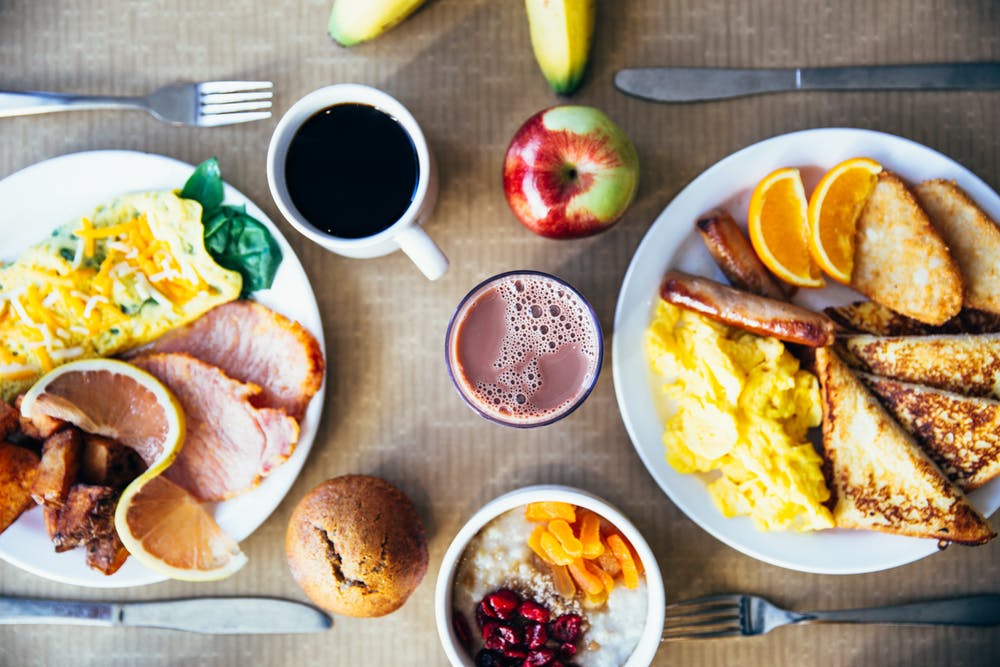
When I began my first #90DaysWithoutSugar challenge one of the main questions I had was about breakfast.
How was I going to survive without eating breakfast?
The concern was alarming because I used to consume most of my sugar during breakfast.
I found interesting facts about the origin of breakfast and the major reason why the modern lifestyle leans towards weight gain.
Our modern world has been designed for convenience and easy, historians have identified two modern changes that is causing widespread obesity.
Firstly, our diet transformed from fresh fruits, vegetables and meat to saturated fats and refined sugar. People started to consume more than the required calories. The average adult doesn’t get the daily required green vegetables, protein and ‘good’ fats.
Secondly, the rapid urbanisation and innovation in transportation has made us immobile. The average office worker sits for 10 hours a day making calls, working on the computer and eating food. When we get home, we do more sitting in front of the TV, having dinner and scrolling on Twitter.
A brief history of breakfast.

“The Romans believed that is healthier to eat one meal a day” – Food historian Caroline Yeldham.
Breakfast was not a part of people’s routine. In medieval Europe eating early was only require for those who were required to be working very early, the elderly and sick.
Ian Mortimer (Historian) believes that Tudor invented the modern breakfast in the 16th century. As people started working for the employer rather than themselves, they lost control of their time and needed a huge meal for the long day ahead.
The Industrial Revolution came in and moved people from their farms to the factories, this era made the breakfast meal a DAILY habit. Some writers suggest that if it wasn’t for the 9-5 arrangement, breakfast would not be a factor in our modern world.
In the 1900s Americans started eating a light and healthy breakfast (green veggies, protein, and good fats). Edward Bernays persuaded doctors to promote bacon and eggs as a healthier alternative. He was working for Beech-Nut a food packaging company. Mr. Bernays managed to convince 5000 doctors to sign a letter authorising bacon and eggs as a hearty breakfast.
In the 1940s breakfast cereal was invented to save us from the ‘bad’ fats people were consuming. The low-fat/no fat movement began to gain momentum in this era.
It was in the 19th century that the term “Breakfast is the most important meal of the day” became famous, it was created by the marketing teams of cereal companies.
We jumped from the frying pan to the fire when we moved from saturated oil-filled bacon breakfast to refined sugar-filled cereal. It seems like the marketing ploy to make breakfast the most important meal of the day worked as the cereal market made $10 Billion sales in 2013.
Where does this leave us?
There are two main schools of thought when it comes to the modern breakfast. There are those who believe that breakfast is the most important meal of the day and those who shun at having breakfast.
Plenty of studies have emerged supporting breakfast to be the most important meal of the day. One study tested participants and found that people who made breakfast their largest meal of the day were more likely to have a lower body mass index (BMI) than those who had a large lunch or dinner.
Breakfast eaters are less likely to overeat during the day, they have lower rates of heart disease, high blood pressure and high cholesterol.However, Dietician Leslie Bonci argued with these findings and concluded that eating breakfast DOESN’T have a positive effect on weight loss or weight maintenance.
In another study researchers designed a study in which 52 obese women took part in a 12-week weight loss programme, they were all given the same number of calories, the other half had breakfast and the other half didn’t have it.
It was discovered that it was not ‘having breakfast’ daily that caused participants to lose weight, however it was thier awareness and changing their normal routine.
Studies of non-breakfast eaters also uncovered some benefits. One pilot study of intermittent fasting found that participants improved thier blood sugar control, insulin sensitivity and had lowers blood pressure.
Finally, should you skip breakfast or should you make it the most important meal of the day? The answer depends on your goal, here are some of my recommendations:
- There is no one-size-fits-all. Breakfast eaters are advising everyone to eat breakfast while non-breakfast eaters are encouraging us to fast. We have seen that arguments from both camps have merit. It is very important to listen to your body. Many people wake up hungry and having an urge to eat and some don’t. It is way better to eat when you are hungry. Find out what works for you.
- If you are on a weight loss journey it may not be a good choice to skip any meals. Starving yourself may cause you to binge when you finally get to eat. Binging will make your fasting meaningless. It is better to eat healthy green veggies, proteins and good fats for breakfast instead of refined sugars and saturated fats. One study found that is much healthier to eat skip breakfast than eating a muffin which contains sugar. The main focus should be about getting the necessary calories your body needs to function optimally.
- Test your body and experiment. In order to find out what your body prefers, do an experiment. One week skip breakfast and see how it treats you, if you are hungry then you probably need to have a healthy breakfast. If you are energetic and don’t feel like eating everything in sight than maybe you can start fasting breakfast to lose weight.
One thing I have learnt on this weight loss journey is that our bodies and energy levels are not the same. We need to take with a pinch of salt everything we read and hear. Our bodies will normally give us signals on what can work for us.
The diets that have failed me in the past, made me starve myself to lose the weight. I went back to binge eating and gained all the weight back, can anyone relate?
One of the reasons I created the #90DaysWithoutSugar Challenge was to focus on a simple habit and step: Cut refined SUGAR from our diets.
This SMALL STEP will train you body to burn good fats for energy and help you lose excess weight (stored sugar and water).
You can sign up for the weekly newsletter here
